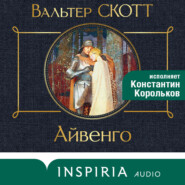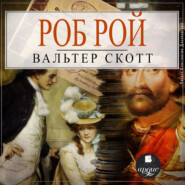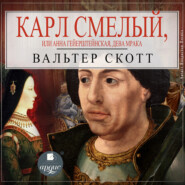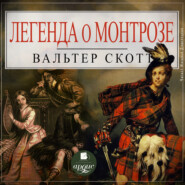По всем вопросам обращайтесь на: info@litportal.ru
(©) 2003-2024.
✖
The Heart of Mid-Lothian, Volume 1
Настройки чтения
Размер шрифта
Высота строк
Поля
Jeanie in the meantime had advanced to the bottom of the table, when, unable to resist the impulse of affections she suddenly extended her hand to her sister. Effie was just within the distance that she could seize it with both hers, press it to her mouth, cover it with kisses, and bathe it in tears, with the fond devotion that a Catholic would pay to a guardian saint descended for his safety; while Jeanie, hiding her own face with her other hand, wept bitterly. The sight would have moved a heart of stone, much more of flesh and blood. Many of the spectators shed tears, and it was some time before the presiding Judge himself could so far subdue his emotion as to request the witness to compose herself, and the prisoner to forbear those marks of eager affection, which, however natural, could not be permitted at that time, and in that presence.
The solemn oath, – "the truth to tell, and no truth to conceal, as far as she knew or should be asked," was then administered by the Judge "in the name of God, and as the witness should answer to God at the great day of judgment;" an awful adjuration, which seldom fails to make impression even on the most hardened characters, and to strike with fear even the most upright. Jeanie, educated in deep and devout reverence for the name and attributes of the Deity, was, by the solemnity of a direct appeal to his person and justice, awed, but at the same time elevated above all considerations, save those which she could, with a clear conscience, call Him to witness. She repeated the form in a low and reverent, but distinct tone of voice, after the Judge, to whom, and not to any inferior officer of the Court, the task is assigned in Scotland of directing the witness in that solemn appeal which is the sanction of his testimony.
When the Judge had finished the established form, he added in a feeling, but yet a monitory tone, an advice, which the circumstances appeared to him to call for.
"Young woman," these were his words, "you come before this Court in circumstances, which it would be worse than cruel not to pity and to sympathise with. Yet it is my duty to tell you, that the truth, whatever its consequences may be, the truth is what you owe to your country, and to that God whose word is truth, and whose name you have now invoked. Use your own time in answering the questions that gentleman" (pointing to the counsel) "shall put to you. – But remember, that what you may be tempted to say beyond what is the actual truth, you must answer both here and hereafter."
The usual questions were then put to her: – Whether any one had instructed her what evidence she had to deliver? Whether any one had given or promised her any good deed, hire, or reward, for her testimony? Whether she had any malice or ill-will at his Majesty's Advocate, being the party against whom she was cited as a witness? To which questions she successively answered by a quiet negative. But their tenor gave great scandal and offence to her father, who was not aware that they are put to every witness as a matter of form.
"Na, na," he exclaimed, loud enough to be heard, "my bairn is no like the Widow of Tekoah – nae man has putten words into her mouth."
One of the judges, better acquainted, perhaps, with the Books of Adjournal than with the Book of Samuel, was disposed to make some instant inquiry after this Widow of Tekoah, who, as he construed the matter, had been tampering with the evidence. But the presiding Judge, better versed in Scripture history, whispered to his learned brother the necessary explanation; and the pause occasioned by this mistake had the good effect of giving Jeanie Deans time to collect her spirits for the painful task she had to perform.
Fairbrother, whose practice and intelligence were considerable, saw the necessity of letting the witness compose herself. In his heart he suspected that she came to bear false witness in her sister's cause.
"But that is her own affair," thought Fairbrother; "and it is my business to see that she has plenty of time to regain composure, and to deliver her evidence, be it true, or be it false —valeat quantum."
Accordingly, he commenced his interrogatories with uninteresting questions, which admitted of instant reply.
"You are, I think, the sister of the prisoner?"
"Yes, sir."
"Not the full sister, however?"
"No, sir – we are by different mothers."
"True; and you are, I think, several years older than your sister?"
"Yes, sir," etc.
After the advocate had conceived that, by these preliminary and unimportant questions, he had familiarised the witness with the situation in which she stood, he asked, "whether she had not remarked her sister's state of health to be altered, during the latter part of the term when she had lived with Mrs. Saddletree?"
Jeanie answered in the affirmative.
"And she told you the cause of it, my dear, I suppose?" said Fairbrother, in an easy, and, as one may say, an inductive sort of tone.
"I am sorry to interrupt my brother," said the Crown Counsel, rising; "but I am in your Lordships' judgment, whether this be not a leading question?"
"If this point is to be debated," said the presiding Judge, "the witness must be removed."
For the Scottish lawyers regard with a sacred and scrupulous horror every question so shaped by the counsel examining, as to convey to a witness the least intimation of the nature of the answer which is desired from him. These scruples, though founded on an excellent principle, are sometimes carried to an absurd pitch of nicety, especially as it is generally easy for a lawyer who has his wits about him to elude the objection. Fairbrother did so in the present case.
"It is not necessary to waste the time of the Court, my Lord since the King's Counsel thinks it worth while to object to the form of my question, I will shape it otherwise. – Pray, young woman, did you ask your sister any question when you observed her looking unwell? – take courage – speak out."
"I asked her," replied Jeanie, "what ailed her."
"Very well – take your own time – and what was the answer she made?" continued Mr. Fairbrother.
Jeanie was silent, and looked deadly pale. It was not that she at any one instant entertained an idea of the possibility of prevarication – it was the natural hesitation to extinguish the last spark of hope that remained for her sister.
"Take courage, young woman," said Fairbrother. – "I asked what your sister said ailed her when you inquired?"
"Nothing," answered Jeanie, with a faint voice, which was yet heard distinctly in the most distant corner of the Court-room, – such an awful and profound silence had been preserved during the anxious interval, which had interposed betwixt the lawyer's question and the answer of the witness.
Fairbrother's countenance fell; but with that ready presence of mind, which is as useful in civil as in military emergencies, he immediately rallied. – "Nothing? True; you mean nothing at first– but when you asked her again, did she not tell you what ailed her?"
The question was put in a tone meant to make her comprehend the importance of her answer, had she not been already aware of it. The ice was broken, however, and with less pause than at first, she now replied, – "Alack! alack! she never breathed word to me about it."
A deep groan passed through the Court. It was echoed by one deeper and more agonised from the unfortunate father. The hope to which unconsciously, and in spite of himself, he had still secretly clung, had now dissolved, and the venerable old man fell forward senseless on the floor of the Court-house, with his head at the foot of his terrified daughter. The unfortunate prisoner, with impotent passion, strove with the guards betwixt whom she was placed. "Let me gang to my father! – I will gang to him – I will gang to him – he is dead – he is killed – I hae killed him!" – she repeated, in frenzied tones of grief, which those who heard them did not speedily forget.
Even in this moment of agony and general confusion, Jeanie did not lose that superiority, which a deep and firm mind assures to its possessor under the most trying circumstances.
"He is my father – he is our father," she mildly repeated to those who endeavoured to separate them, as she stooped, – shaded aside his grey hairs, and began assiduously to chafe his temples.
The Judge, after repeatedly wiping his eyes, gave directions that they should be conducted into a neighbouring apartment, and carefully attended. The prisoner, as her father was borne from the Court, and her sister slowly followed, pursued them with her eyes so earnestly fixed, as if they would have started from their sockets. But when they were no longer visible, she seemed to find, in her despairing and deserted state, a courage which she had not yet exhibited.
"The bitterness of it is now past," she said, and then boldly, addressed the Court. "My Lords, if it is your pleasure to gang on wi' this matter, the weariest day will hae its end at last."
The Judge, who, much to his honour, had shared deeply in the general sympathy, was surprised at being recalled to his duty by the prisoner. He collected himself, and requested to know if the panel's counsel had more evidence to produce. Fairbrother replied, with an air of dejection, that his proof was concluded.
The King's Counsel addressed the jury for the crown. He said in a few words, that no one could be more concerned than he was for the distressing scene which they had just witnessed. But it was the necessary consequence of great crimes to bring distress and ruin upon all connected with the perpetrators. He briefly reviewed the proof, in which he showed that all the circumstances of the case concurred with those required by the act under which the unfortunate prisoner was tried: That the counsel for the panel had totally failed in proving, that Euphemia Deans had communicated her situation to her sister: That, respecting her previous good character, he was sorry to observe, that it was females who possessed the world's good report, and to whom it was justly valuable, who were most strongly tempted, by shame and fear of the world's censure, to the crime of infanticide: That the child was murdered, he professed to entertain no doubt. The vacillating and inconsistent declaration of the prisoner herself, marked as it was by numerous refusals to speak the truth on subjects, when, according to her own story, it would have been natural, as well as advantageous, to have been candid; even this imperfect declaration left no doubt in his mind as to the fate of the unhappy infant. Neither could he doubt that the panel was a partner in this guilt. Who else had an interest in a deed so inhuman? Surely neither Robertson, nor Robertson's agent, in whose house she was delivered, had the least temptation to commit such a crime, unless upon her account, with her connivance, and for the sake of saying her reputation. But it was not required of him, by the law, that he should bring precise proof of the murder, or of the prisoner's accession to it. It was the very purpose of the statute to substitute a certain chain of presumptive evidence in place of a probation, which, in such cases, it was peculiarly difficult to obtain. The jury might peruse the statute itself, and they had also the libel and interlocutor of relevancy to direct them in point of law. He put it to the conscience of the jury, that under both he was entitled to a verdict of Guilty.
The charge of Fairbrother was much cramped by his having failed in the proof which he expected to lead. But he fought his losing cause with courage and constancy. He ventured to arraign the severity of the statute under which the young woman was tried. "In all other cases," he said, "the first thing required of the criminal prosecutor was to prove unequivocally that the crime libelled had actually been committed, which lawyers called proving the corpus delicti. But this statute, made doubtless with the best intentions, and under the impulse of a just horror for the unnatural crime of infanticide, ran the risk of itself occasioning the worst of murders, the death of an innocent person, to atone for a supposed crime which may never have been committed by anyone. He was so far from acknowledging the alleged probability of the child's violent death, that he could not even allow that there was evidence of its having ever lived."
The King's Counsel pointed to the woman's declaration; to which the counsel replied – "A production concocted in a moment of terror and agony, and which approached to insanity," he said, "his learned brother well knew was no sound evidence against the party who emitted it. It was true, that a judicial confession, in presence of the Justices themselves, was the strongest of all proof, insomuch that it is said in law, that 'in confitentem nullae sunt partes judicis.' But this was true of judicial confession only, by which law meant that which is made in presence of the justices, and the sworn inquest. Of extrajudicial confession, all authorities held with the illustrious Farinaceus and Matthaeus, 'confessio extrajudicialis in se nulla est; et quod nullum est, non potest adminiculari.' It was totally inept, and void of all strength and effect from the beginning; incapable, therefore, of being bolstered up or supported, or, according to the law phrase, adminiculated, by other presumptive circumstances. In the present case, therefore, letting the extrajudicial confession go, as it ought to go, for nothing," he contended, "the prosecutor had not made out the second quality of the statute, that a live child had been born; and that, at least, ought to be established before presumptions were received that it had been murdered. If any of the assize," he said, "should be of opinion that this was dealing rather narrowly with the statute, they ought to consider that it was in its nature highly penal, and therefore entitled to no favourable construction."
He concluded a learned speech, with an eloquent peroration on the scene they had just witnessed, during which Saddletree fell fast asleep.
It was now the presiding Judge's turn to address the jury. He did so briefly and distinctly.
"It was for the jury," he said, "to consider whether the prosecutor had made out his plea. For himself, he sincerely grieved to say, that a shadow of doubt remained not upon his mind concerning the verdict which the inquest had to bring in. He would not follow the prisoner's counsel through the impeachment which he had brought against the statute of King William and Queen Mary. He and the jury were sworn to judge according to the laws as they stood, not to criticise, or evade, or even to justify them. In no civil case would a counsel have been permitted to plead his client's case in the teeth of the law; but in the hard situation in which counsel were often placed in the Criminal Court, as well as out of favour to all presumptions of innocence, he had not inclined to interrupt the learned gentleman, or narrow his plea. The present law, as it now stood, had been instituted by the wisdom of their fathers, to check the alarming progress of a dreadful crime; when it was found too severe for its purpose it would doubtless be altered by the wisdom of the Legislature; at present it was the law of the land, the rule of the Court, and, according to the oath which they had taken, it must be that of the jury. This unhappy girl's situation could not be doubted; that she had borne a child, and that the child had disappeared, were certain facts. The learned counsel had failed to show that she had communicated her situation. All the requisites of the case required by the statute were therefore before the jury. The learned gentleman had, indeed, desired them to throw out of consideration the panel's own confession, which was the plea usually urged, in penury of all others, by counsel in his situation, who usually felt that the declarations of their clients bore hard on them. But that the Scottish law designed that a certain weight should be laid on these declarations, which, he admitted, were quodammodo extrajudicial, was evident from the universal practice by which they were always produced and read, as part of the prosecutor's probation. In the present case, no person who had heard the witnesses describe the appearance of the young woman before she left Saddletree's house, and contrasted it with that of her state and condition at her return to her father's, could have any doubt that the fact of delivery had taken place, as set forth in her own declaration, which was, therefore, not a solitary piece of testimony, but adminiculated and supported by the strongest circumstantial proof.
"He did not," he said, "state the impression upon his own mind with the purpose of biassing theirs. He had felt no less than they had done from the scene of domestic misery which had been exhibited before them; and if they, having God and a good conscience, the sanctity of their oath, and the regard due to the law of the country, before their eyes, could come to a conclusion favourable to this unhappy prisoner, he should rejoice as much as anyone in Court; for never had he found his duty more distressing than in discharging it that day, and glad he would be to be relieved from the still more painful task which would otherwise remain for him."
The jury, having heard the Judge's address, bowed and retired, preceded by a macer of Court, to the apartment destined for their deliberation.
CHAPTER TWENTY-THIRD
Law, take thy victim – May she find the mercy
In yon mild heaven, which this hard world denies her!
It was an hour ere the jurors returned, and as they traversed the crowd with slow steps, as men about to discharge themselves of a heavy and painful responsibility, the audience was hushed into profound, earnest, and awful silence.
"Have you agreed on your chancellor, gentlemen?" was the first question of the Judge.
The foreman, called in Scotland the chancellor of the jury, usually the man of best rank and estimation among the assizers, stepped forward, and with a low reverence, delivered to the Court a sealed paper, containing the verdict, which, until of late years, that verbal returns are in some instances permitted, was always couched in writing. The jury remained standing while the Judge broke the seals, and having perused the paper, handed it with an air of mournful gravity down to the clerk of Court, who proceeded to engross in the record the yet unknown verdict, of which, however, all omened the tragical contents. A form still remained, trifling and unimportant in itself, but to which imagination adds a sort of solemnity, from the awful occasion upon which it is used. A lighted candle was placed on the table, the original paper containing the verdict was enclosed in a sheet of paper, and, sealed with the Judge's own signet, was transmitted to the Crown Office, to be preserved among other records of the same kind. As all this is transacted in profound silence, the producing and extinguishing the candle seems a type of the human spark which is shortly afterwards doomed to be quenched, and excites in the spectators something of the same effect which in England is obtained by the Judge assuming the fatal cap of judgment. When these preliminary forms had been gone through, the Judge required Euphemia Deans to attend to the verdict to be read.

















